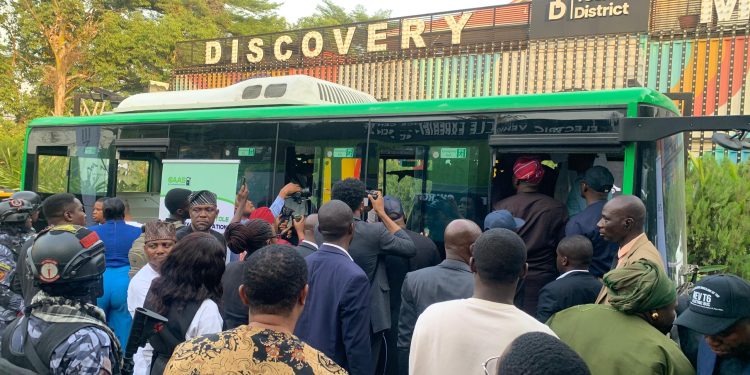NEV Motors has launched its set of locally-made electric vehicles to drive affordable, clean, and efficient public transportation in Nigeria.
At the unveiling of the NEV T6 electric buses in Abuja on Saturday, the Chief Executive Officer, Mosope Olaosebikan, said the event symbolised Nigeria’s readiness to embrace sustainable mobility solutions.
“There were doubts about whether EVs could work in Nigeria, but today we have proven that it is possible,” he said.
Olaosebikan noted that the newly introduced NEV T6 electric buses would reduce Nigeria’s dependence on fossil fuels while advancing clean and cost-effective transportation.
He reaffirmed the company’s commitment to pioneering sustainable mobility in Africa, adding that the buses are 100 per cent electric with zero fossil emissions.
“Tonight is more than just a product launch. It’s a revolution and a technology disruption. It is also a declaration to the world that Africa is not waiting for the future—we are building it, charging it, and driving it ourselves,” he declared.
Reflecting on the challenges faced in bringing electric vehicles into the country, Olaosebikan said there was initial scepticism about their feasibility in Nigeria.
He also acknowledged the struggle to secure government support for the project.
“They told us electric vehicles would not work here. We built the infrastructure. They told us the government would not listen. We championed policies—and won. Today, electric vehicles can be imported with minimal taxes, making them more accessible than ever.
“And today, we are unveiling more than just a bus. We are unveiling a vision—a future where clean, reliable, and affordable electric transport isn’t a dream—it’s a reality,” he said.
The Federal Government reaffirmed its commitment to harnessing Nigeria’s natural resources for local electric vehicle production. The Minister of Science and Technology, Uche Nnaji, said the country is prioritising lithium processing to support battery manufacturing rather than exporting raw materials.
“Nigeria has abundant lithium reserves, and we are focused on processing it locally for battery production rather than exporting raw materials,” he said. “This will support electric vehicle manufacturing, create jobs, and boost the economy.”
The Minister of State for Industry, John Enoh, said the Federal Government is actively promoting sustainable transportation and carbon reduction, aligning with its target of achieving 30 per cent electric mobility growth under the National Automotive Industrial Development Plan.
“Electric vehicles represent the future of mobility, and that future starts today,” Enoh said. “This launch goes beyond introducing buses; it is about embracing innovation to ensure Nigeria remains competitive in the global automotive industry.”
He also stressed the importance of local content development in the sector, urging stakeholders to enhance Nigeria’s economic sustainability through domestic vehicle production.
The Director-General of the National Automotive Design and Development Council, Joseph Osanipin, emphasised the need for electric vehicles to be affordable for Nigerians.
“For us in NADDC, we know that the path we are treading will lead us to sustainable mobility, and we are working with relevant bodies to provide the needed infrastructure,” he said. “The buses we are inaugurating today are 100 percent electric with zero emissions, and we know what that signifies for our health and environment.”
The Executive Vice-Chairman of the National Agency for Science and Engineering Infrastructure, Khalil Halilu, stressed the need for renewable energy infrastructure to support the transition to electric mobility.
“Electric vehicles cannot be powered by fossil fuels. This shift is about more than transportation; it is a step towards revolutionising Nigeria’s energy sector,” Halilu said.
With Nigeria’s vast solar energy potential, he said the country should be at the forefront of renewable energy adoption.















